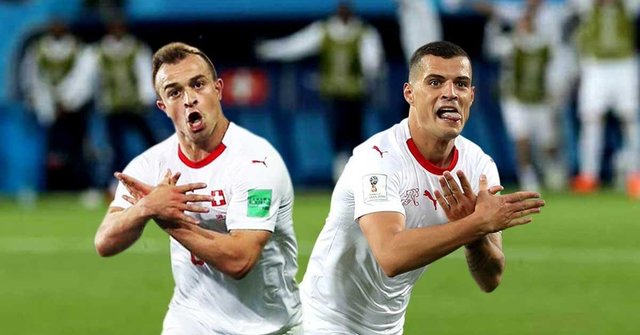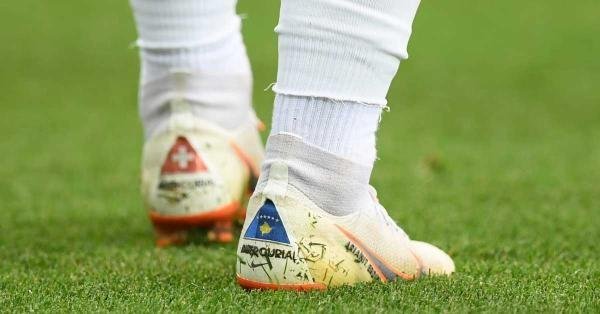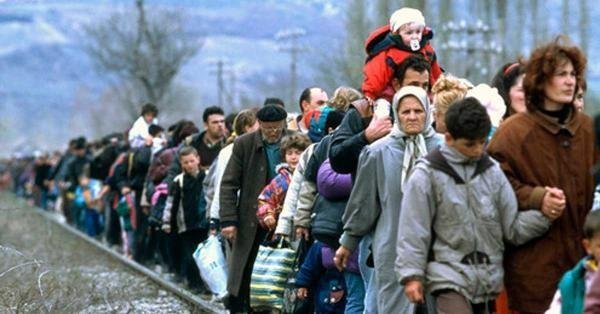The Revenge of Balkan Conflict

Over scored Switzerland's first goal against Serbia in the second matchday of Group E World Cup 2018 on Saturday (23/06/2018), midfielder Granit Xhaka celebrated by celebrating in the form of two hands to form a two-headed eagle, similar to the Albanian symbol. A similar celebration made Xherdan Shaqiri after scoring a goal that ensured a Swiss victory at Kaliningrad Stadium.
The controversial celebrity is so spice in its full of prestige. He wandered past bitter nan. Although Switzerland and Serbia have never formally confronted, the Swiss team's composition at the 2018 World Cup contains many Balkans. In addition to Granite and Shaqiri, Switzerland is also strengthened Blerim Dzmaili and Valon Behrami who - in his left arm tattooed the flag of Kosovo and his right arm tattooed the Swiss flag - also bloody Albanian. In addition, there are Haris Seferovic and Mario Gavranovic (Bosnia), and Josip Drmic (Croatia). The majority have an unfinished past with Serbia.

Granite and Shaqiri seem to be the exponents of the conflict. The second celebration by clasping two hands in the shape of a two-headed eagle, similar to the Albanian symbol, is clearly a provocation against Serbian teams and supporters. Both are Kosovo-blooded Albanian citizens, a country once fought by Serbs in the Balkan conflict.
Before the game, the aroma of Balkan conflicts has been felt when various news about Shoequr Nike Shoes appear. In his left shoe, Shaqiri showed off a Swiss flag, while on his right was the flag of Kosovo, his native country 26 years ago.
Just wearing a pair of shoes that alone Shaqiri trigger provocation for Serbia. "If they love Kosovo so much, why do not they play for their own country instead of Switzerland," said Serbian striker Aleksandar Mitrovic responding to the psy war ahead of the fight, quoted by the Washington Post on June 21, 2018.
Dark Memories of the Silam
The actions of Granite and Shaqiri are clearly political. Emotions due to the bitter experience of the past, caused by the Kosovo Conflict, both with their families have not disappeared.
The conflict in Kosovo escalated into post-natal violence of Ushtria Clirimtare e Kosoves (UCK) aka the Kosovo Liberation Army in 1991. Until the end of the war (June 11, 1999) hundreds of thousands of civilians were victims. According to Tim Judah in The Serbs: History, Myth and the Destruction of Yugoslavia, about 848-863 thousand or 90 percent of the Albanian population in Kosovo were forced to flee. Approximately 8,661 others were killed or missing. While on the Serbian side, 230 thousand residents lost their homes and approximately 3,500 other souls were killed or missing.

Granites and Shaqiri are just two of the 200-thousand war casualties in Kosovo. Shaqiri, for example, had to evacuate as a baby. Born in Gjilan, Yugoslavia (now Kosovo region) October 10, 1991, Shaqiri and his three brothers were brought both parents out of Kosovo. They fled more than 1000 miles to reach Augst, Switzerland.
"I never forget that I was born in Kosovo. A very poor country. Not a lot of jobs, not much money. My uncle's house was set on fire, but my house is still standing, even though it's broken here and there, things are stolen and the walls of my house are doodled, "Shaqiri recalled, quoted by the Independent on June 23, 2018.
Meanwhile, Granite was born in Basel, Switzerland 25 years ago from Albanian blooded couples, Ragip and Eli Xhaka. The couple originally lived in Kursumlija, Serbia. Once the conflict broke out, the parents of the player who is now a career in Arsenal FC had to move from Kursumlija to Podujevo (Kosovo) before reaching Switzerland in 1990.
When interviewed Dave Hytner of The Guardian, November 17, 2017, Granit disclosed, his father had been jailed by the Serbian government while still a student. "As far as I know, he's fine at the start of his term. But then he was also beaten in custody, "recalls Granite.
Ragip Xhaka was arrested by the government for participating in a demonstration in 1986. The demonstration was part of the 1986-1989 Anti-Bureaucratic Revolution against the Serbian autonomous government in Kosovo and Montenegro. Demonstrations spread to Pristina to Vojvodina.
Ragip jailed for three and a half years. After being released and married, he moved to Switzerland and proclaimed there.
Unlike his brother Taulant Xhaka, who voted for the Albanian national team, Granit chose to serve the Swiss team. However, it does not mean he and Shaqiri may be provocative in a match because FIFA has repeatedly insisted it wants to keep football out of politics.
"The FIFA Disciplinary Committee opens checks on Granite Xhaka and Xherdan Shaqiri on goal celebrations in Switzerland vs Serbia," FIFA said, quoted by Sky Sports, June 24, 2018. Judging from FIFA's disciplinary regulation article 54, the provocation of the general public in its two-time ban compete and fined at least USD5.062.